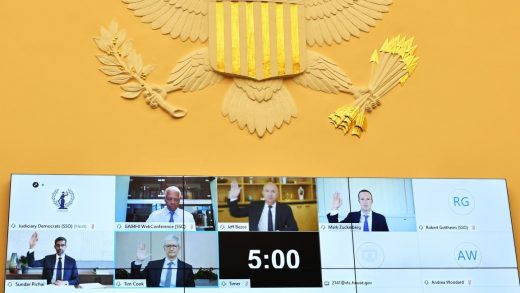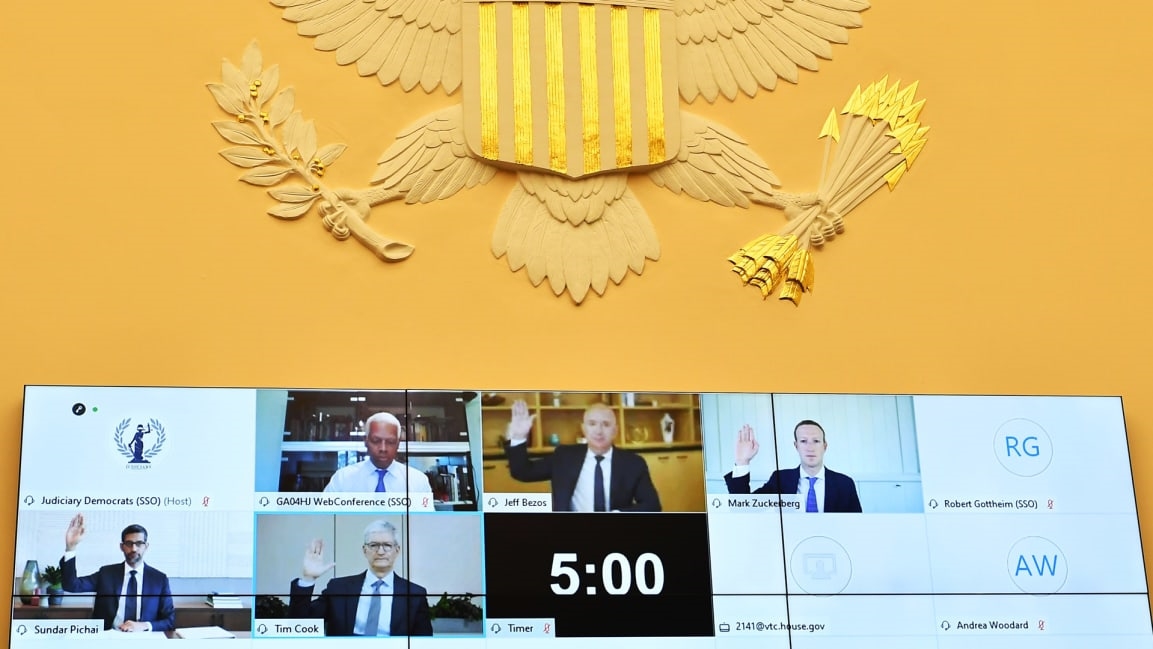Zuck, Bezos, Cook: Who takes the fall in D.C.’s antitrust games?
You could see it in their eyes as they testified before Congress. Jeff Bezos staring at Tim Cook. Cook staring at Sundar Pichai. Pichai staring at Mark Zuckerberg. Zuck going off script to throw everyone else under the bus. They were all thinking the same exact thing: I don’t have to outrun the bear. I just have to outrun you.
The bear, in this case, is Washington: a disorganized mess of partisans and publicity-seekers temporarily united in opposition to Silicon Valley. Republicans, convinced that conservative voices are being suppressed on social media, want a pound of flesh. Democrats want justice. For the Big Four, there’s no safe harbor from the antitrust storm.
The hearing itself was more circus than bread, but America’s new Rockefellers have reason to worry. Assuming the polls hold, when Joe Biden wins in November, he’ll owe a debt of gratitude to the left wing of the Democratic Party. Unlike in 2016, when Bernie Sanders supporters sat on their hands and paved the way for Donald Trump, every major progressive has embraced Biden’s candidacy. Biden’s going to owe a lot of people who want to see Silicon Valley cut down to size.
Sure, I may be bad, but I’m not as bad as the next guy.”
The tech giants know this. Someone’s going down. Their real fight isn’t with Congress or the Department of Justice or regulators from any particular agency. The real fight is to make another company the more appealing target.
Testifying via webcam, each CEO had his precanned lines about how they’re patriots (Zuckerberg) or the embodiment of the American dream (Bezos) or a humble phone manufacturer who really shouldn’t be here (Cook). “Just as America’s technology leadership is not inevitable, Google’s continued success is not guaranteed,” Pichai argued, cleverly tying America’s fate to his own. “Google operates in highly competitive and dynamic global markets.”
The point wasn’t to convince Congress that they’re angels. Facebook failed to prevent Russian interference in our elections and turned American politics into an algorithmic rage machine. Amazon’s market position is so dominant that it can erase billions of dollars in value just by looking at a competitor. Apple, which takes a cut of practically every dollar that flows through its ecosystem, is approaching a $2 trillion market cap. Google has been fined three times by the EU for anticompetitive behavior.
The point was this: “Sure, I may be bad, but I’m not as bad as the next guy.”
The truth is, Biden won’t have the political capital to prosecute more than one of these companies. If and when the next administration looks to make an example of a major tech company, it will have to consider a number of factors: who’s the least popular, who has the worst case in court, whose downfall would best help consumers—and who can hurt them politically.
Here’s a quick primer on the strengths and weaknesses of each, in order of least to most vulnerable:
Apple
In reality, most people don’t use Apple products. They’re too expensive. Experts estimate that over 85% of the global population uses Android. But people with influence love Apple. Reporters, staffers, lawmakers, regulators, pundits, lobbyists, think tankers, and everyone else wading through the swamp are all Apple devotees. As a result, making the case politically against Apple has an implicitly higher bar than against the other big tech companies. Yes, the app store is monopolistic, and yes, it’s suspicious that your phone and laptop always seem to break the minute a new model becomes available. But Tim Cook is impossible to dislike, and his consistent advocacy on behalf of user privacy has won him plaudits across the political spectrum.
Amazon
People may not like Amazon as a company, but they love Amazon’s services and products. Amazon’s stock is up nearly 25% since the pandemic began. And Bezos himself is a master of soft power, wielding the Washington Post in one hand and HQ2s in the other. There’s nobody in Washington who doesn’t secretly wish to be invited to the parties at his Kalorama mansion. It’s not hard to envision the Justice Department forcing Amazon to spin AWS, or to separate its marketplace and third-party sellers, but if you’re looking for an easy scapegoat, Amazon probably isn’t it.
Once upon a time, Google could smile, say “Don’t be evil,” and all was forgiven. Those days are long gone. Attorneys general from 48 states, Puerto Rico, and the District of Columbia are investigating Google for anticompetitive behavior. There’s no Google product that’s truly exciting or beloved. There’s just the search engine, and it’s been around for so long that it might as well be a phone company or local gas utility. Unplugging Google from its digital ad server, DoubleClick Ad Exchange, might be tricky, but YouTube could be spun off without too much fuss.
And here’s the weakest link. Zuckerberg is unlikeable and untrustworthy. His second-in-command, Sheryl Sandberg, fell from favor years ago. And Facebook’s underlying value proposition is far more dubious than its peers. Amazon gets you toothpaste overnight. Apple makes cool phones. Google lets you find anything in seconds. But Facebook? Sure, you can keep tabs on your best friend from third grade or see photos of your great aunt’s cat. But you’re also constantly wading into pools of anger and hate. The whole experience can feel icky.
Most important, the remedy for Facebook’s anticompetitive behavior is easy: Just turn Instagram, WhatsApp, and Facebook proper into three separate companies. That’s a solution that even octogenarian elected officials can understand. It will be good press for the government, day after day, news cycle after cycle. It’s a good fight to have.
Critically, Zuckerberg has already given Washington an opening with his flawed defense of Facebook’s 2012 acquisition of Instagram, a competitor he had sought, in his own words, to neutralize. “Mr. Zuckerberg, you are making my point,” replied Judiciary Committee Chairman Jerry Nadler.
Representative David Cicilline, who chairs the antitrust subcommittee, said afterward that Zuckerberg “acknowledged in this hearing that his acquisition of WhatsApp and Instagram were part of a plan to both buy a competitor and also maintain his money, power, or his dominance. That’s classic monopoly behavior.”
Look for Apple, Amazon, and Google to reach the same conclusion and start positioning Zuckerberg as the fall guy. They’ll leak rumors of new FTC activity. Their lobbyists will quietly press Biden appointees to go after Facebook. They’ll do everything they can to shape consensus that Facebook’s the one—and in Washington, the more something becomes consensus, the more it becomes reality.
Bradley Tusk is a venture capitalist, writer, philanthropist, and political strategist.
(17)



